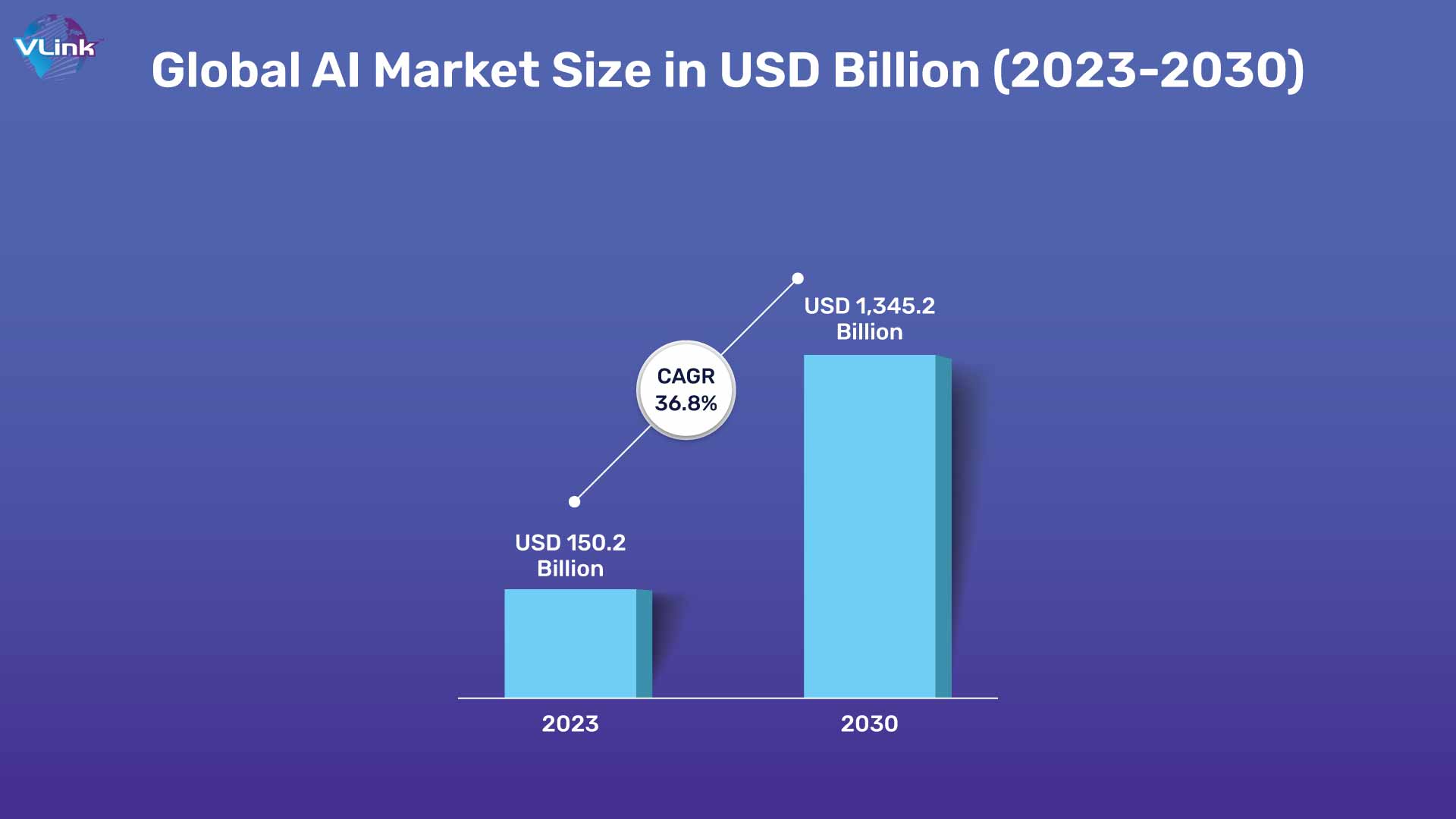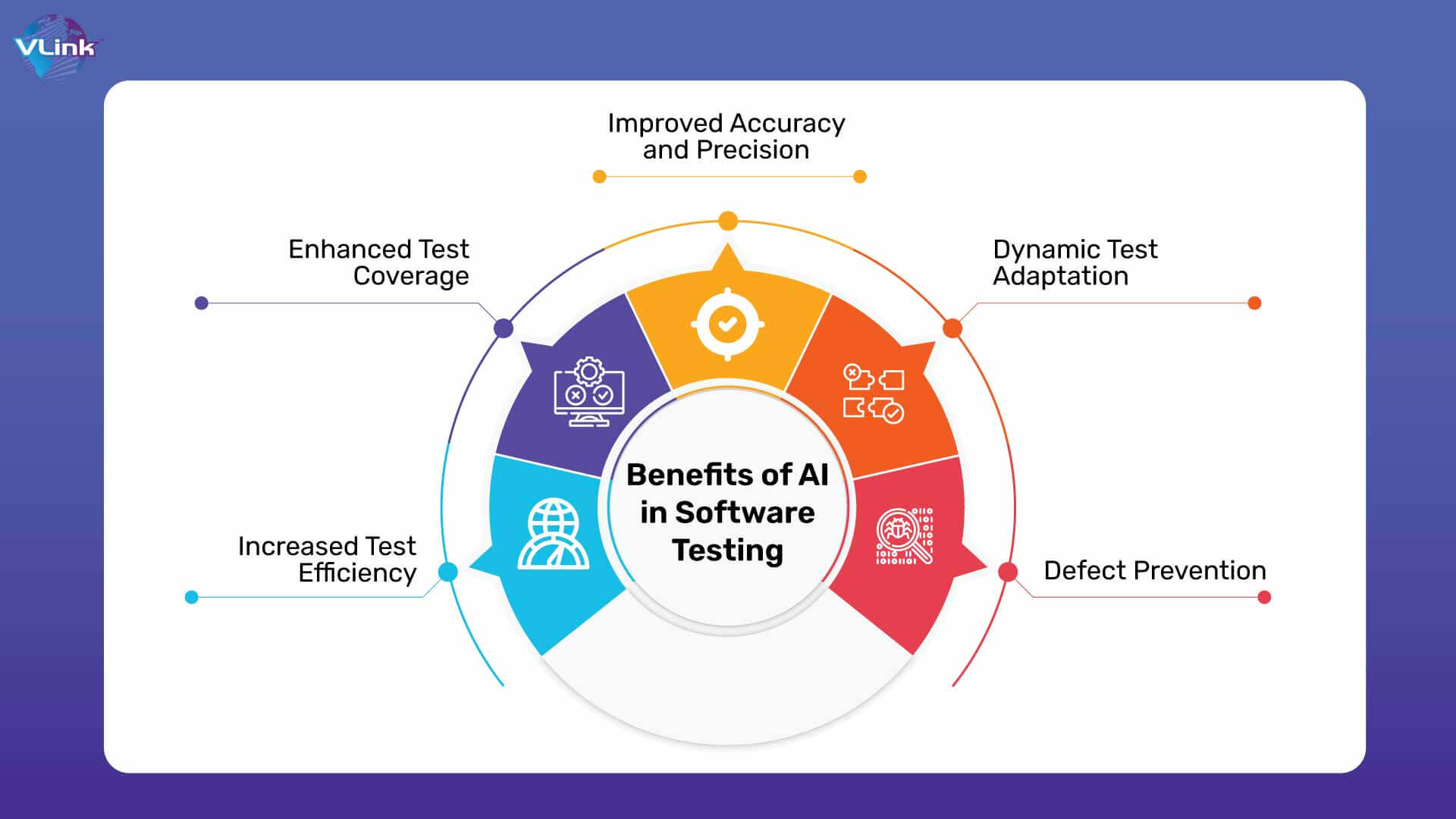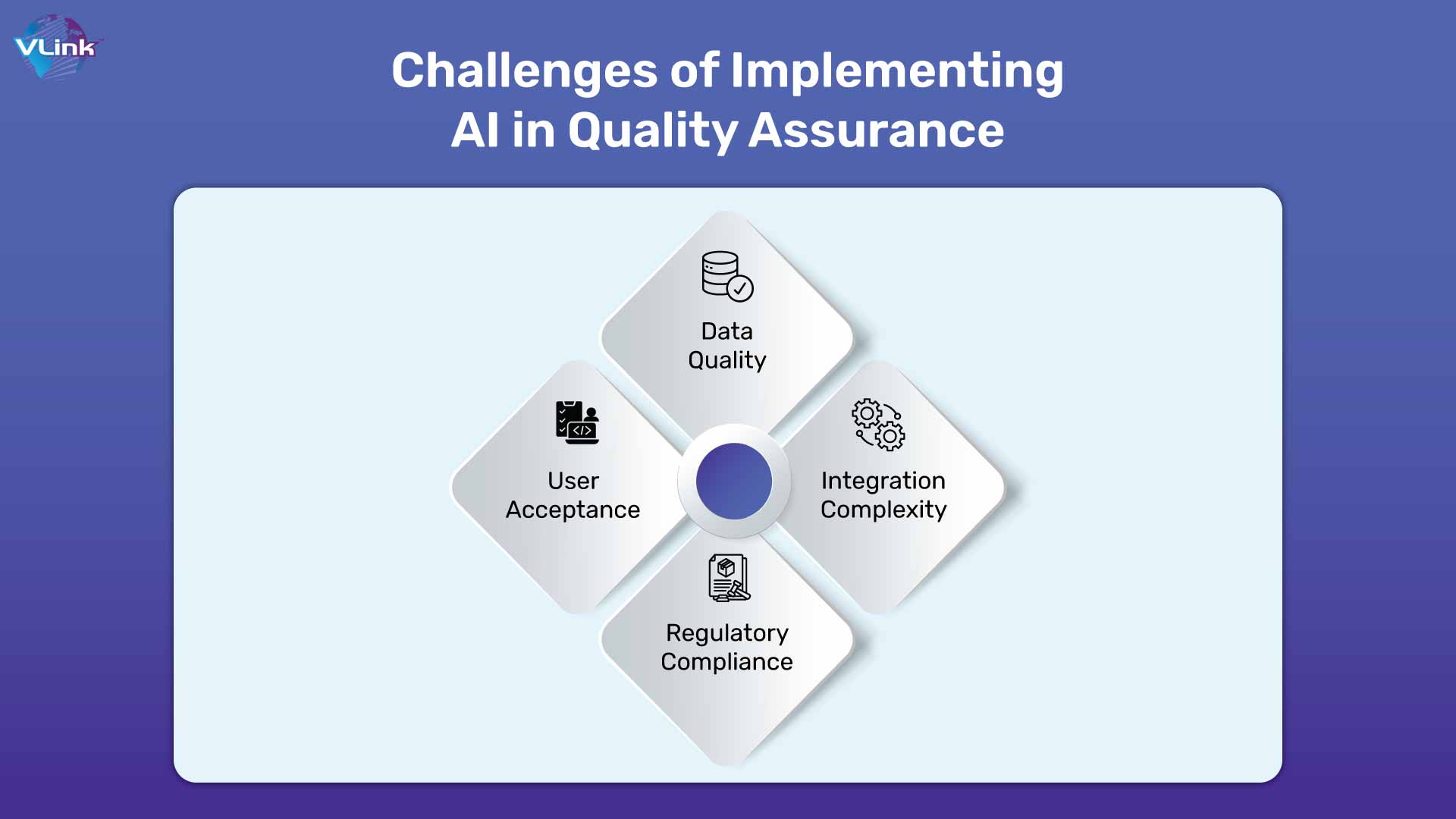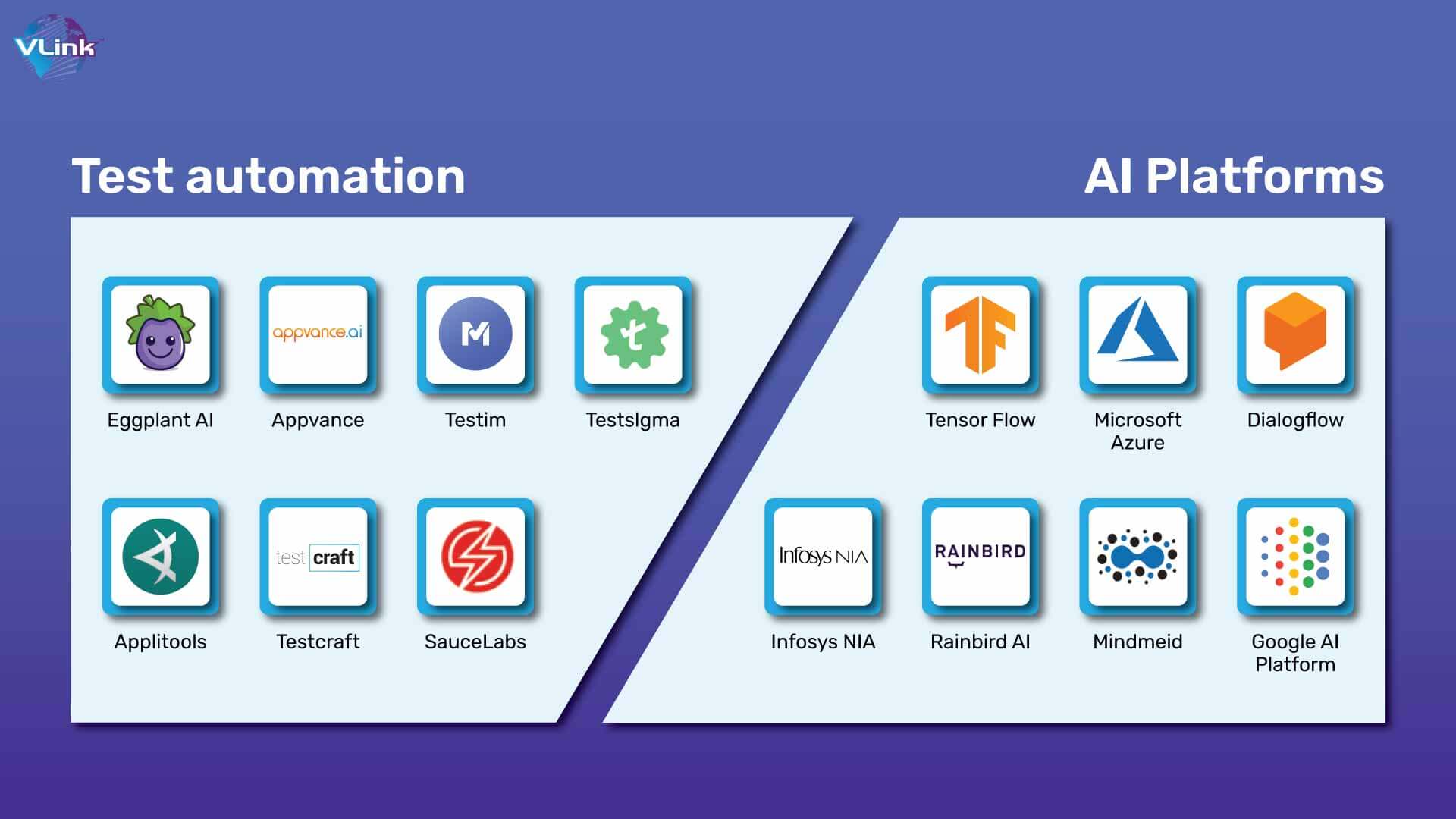“While quality assurance in software development has traditionally been manual, there has been a recent shift from manual to autonomous practices by incorporating AI into the process” - Nikhil Khandelwal, VP Manager at VLink.
Amidst the excitement surrounding generative AI, an often-underestimated application of artificial intelligence lies in quality assurance, especially within sectors like software development.
Companies enthusiastically embrace AI in quality assurance to streamline operations and reduce costs. Artificial Intelligence enables seamless data sharing, predicts customer behavior, provides product recommendations, detects fraudulent activities, customizes marketing for specific demographics, and delivers valuable customer support.
The global AI market was valued at USD 150.2 billion in 2023 and is expected to grow at a CAGR of 36.8% from 2023 to 2030. And the revenue forecast for 2030 is predicted to grow at USD 1,345.2 billion.

Still trying to figure out the feasibility of AI in quality assurance? Consider these remarkable statistics:
• 63% of companies recognize that the need to reduce costs will drive their adoption of AI.
• 61% of business leaders claim that AI aids them in discovering business opportunities they might not otherwise identify.
This blog will explore how AI in quality assurance is changing automation testing. Let's start with a basic introduction.
What is AI in Quality Assurance?
AI can handle advanced tasks traditionally within the domain of human cognitive abilities. Notably:
Natural Language Processing (NLP):
Considering linguistic nuances, AI can comprehend, interpret, and respond to human language. In QA, this translates to the ability to understand user requirements in plain language and convert them into test cases or automation scripts.
Learning and Improvement:
Machine Learning (ML), a subset of AI, allows systems to learn independently from experience without explicit programming. QA teams can train AI during testing sessions, enabling it to grasp testing patterns and refine its recommendations to align more closely with organizational needs.
Computer Vision:
AI can analyze and interpret visual data, identifying anomalies in the user interface (UI). For QA teams, this means more precise visual regression testing.
Integrating AI into the QA process brings us closer to the future of autonomous testing.
How is AI Revolutionizing Automation Testing in Quality Assurance?
Intelligent Test Case Generation
AI automatically analyzes requirements to generate test cases, reducing manual efforts and improving coverage.
Scripting and Maintenance
AI automates test script creation and adapts scripts to changes, minimizing maintenance efforts.
Natural Language Processing (NLP)
AI-driven NLP understands, interprets, and responds to human language, facilitating efficient test scenario creation.
Self-Learning and Improvement
Machine learning enables AI to learn from testing experiences, adapting and improving recommendations over time.
Computer Vision for UI Testing
AI's computer vision capabilities enhance visual regression testing, accurately detecting anomalies in the user interface.
Predictive Analytics
AI analyzes historical data for defect prediction, enabling proactive testing in high-risk areas.
Performance Testing Optimization
AI optimizes load testing by simulating realistic scenarios, improving resource allocation, and enhancing performance evaluations.
Continuous Testing Integration
AI seamlessly integrates with CI/CD pipelines, enabling continuous testing for rapid feedback loops.
In summary, AI-driven QA transforms automation testing by automating tasks, improving accuracy, and enabling adaptive testing, ultimately enhancing software quality.
Also Learn: The role of automated testing for software product development.
Benefits of Using AI in Quality Assurance

Increased Test Efficiency
AI automates repetitive and time-consuming testing tasks, leading to faster test execution. This efficiency allows QA teams to focus on more complex scenarios, improving overall testing coverage and effectiveness.
Enhanced Test Coverage
With AI's ability to generate test cases and scenarios, QA teams can achieve broader test coverage. AI algorithms can identify critical areas for testing, ensuring a more comprehensive examination of the software under different conditions and use cases.
Improved Accuracy and Precision
AI-powered testing tools exhibit high accuracy in executing test scripts and identifying defects. Machine learning algorithms can learn from previous testing experiences, making predictions about potential areas of failure and significantly reducing false positives and negatives.
Dynamic Test Adaptation
AI enables adaptive testing that adjusts to changes in the application. Through self-healing capabilities, AI-driven testing tools can automatically update test scripts, ensuring that the testing process remains effective even as the software evolves.
Predictive Analytics for Defect Prevention
AI analyzes historical testing data to predict potential defect-prone areas in the code. This proactive approach allows QA teams to focus testing efforts on critical components, leading to early defect detection and prevention.
Challenges of Implementing AI in Quality Assurance

The success of AI in QA relies on high-quality and abundant data. Consistent or insufficient data can lead to accurate predictions and compromised testing outcomes.
Integrating AI tools seamlessly with existing QA processes and tools can be complex, requiring workflow adjustments and potential disruptions.
Meeting regulatory requirements, especially in industries with stringent compliance standards, complicates implementing AI in QA.
Gaining trust and acceptance for AI-driven processes within QA teams and among stakeholders is crucial. It requires educational efforts, training initiatives, and proficient communication to effectively convey the reliability and advantages of incorporating AI into testing processes.
AI Testing Tools for Quality Assurance and Automation Testing
Recently, AI testing tools have become popular in quality assurance, contributing to heightened testing efficiency and improved accuracy.
The market for AI-enabled testing tools is expected to reach a valuation of $426.1 million in 2023 and is forecasted to grow to $2,030.75 million by 2033. The market is set to achieve a CAGR of 16.9% throughout the forecast period.
Below is an image of AI testing tools used in Quality Assurance for automation testing services.

VLink Helps Businesses Transform QA using AI Automation Testing Services!
VLink, a specialized software testing and quality assurance company, provides comprehensive AI-driven solutions to transform your QA processes. Leveraging AI enhances testing efficiency, accuracy, and agility. We reduce manual testing efforts using AI-powered test automation, accelerate execution, and improve coverage.
Our expertise in developing self-healing test scripts ensures robustness amid application changes. We optimize test data management with AI, ensuring diverse datasets for thorough QA software and testing services and aiding data privacy compliance.
Whether optimizing test cases or improving security, our tailored machine learning and AI development solutions elevate your QA processes, delivering robust, secure, high-quality software products.
Frequently Asked Questions
The future of autonomous testing and AI in QA is promising. As AI continues to evolve, it will play a central role in automating testing processes, enhancing efficiency, and providing intelligent insights. Expect increased autonomy, faster testing cycles, and improved accuracy, ultimately leading to higher-quality software releases.
To leverage AI-driven testing for QA test automation:
- Start by identifying testing areas suitable for automation.
- Implement tools with AI capabilities for test case generation, script maintenance, and execution.
- Train the AI system through testing sessions to refine its recommendations.
Utilize NLP for natural language-based testing. Embrace machine learning for adaptive testing. Regularly update and enhance AI models to ensure continuous test efficiency, coverage, and accuracy improvement.
Manual testing involves human testers executing test cases without automation tools, relying on observation and intuition.
Automation testing utilizes software tools to execute pre-scripted tests, improving efficiency and repeatability.
Manual testing suits exploratory or ad-hoc scenarios, while automation is ideal for repetitive and regression testing in large-scale projects.














